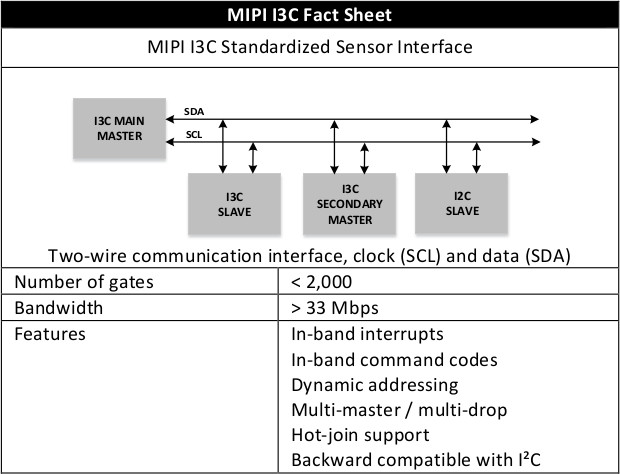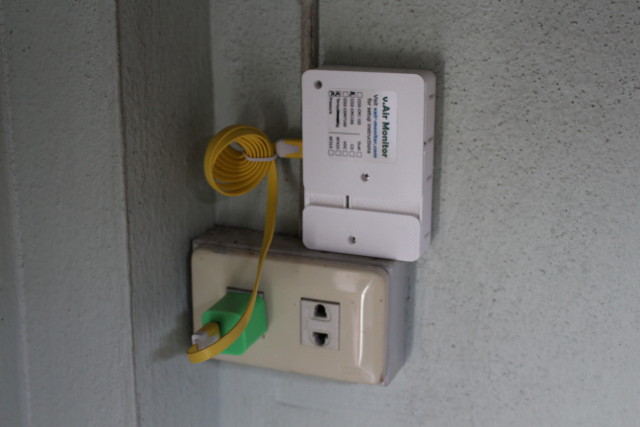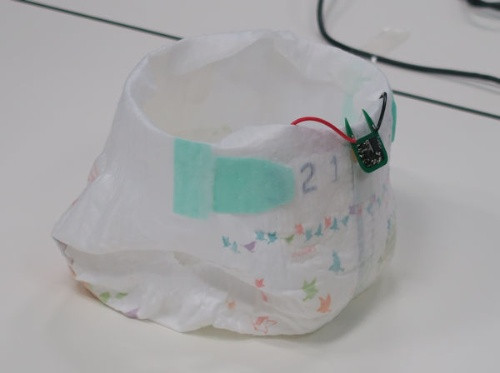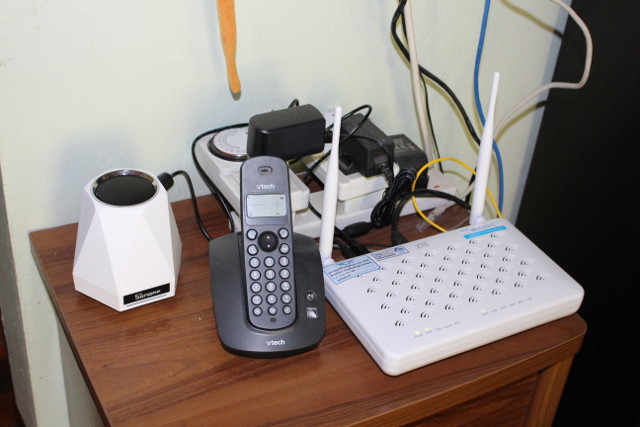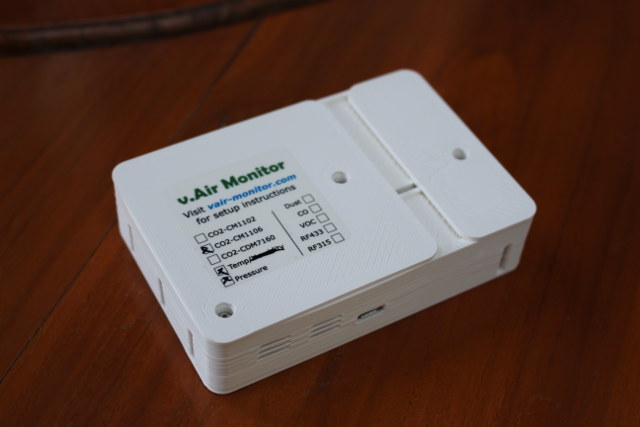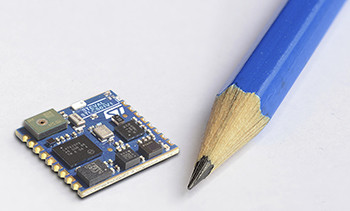I2C (Inter-Integrated Circuit) is one of the most commonly used serial bus for interfacing sensors and other chips, and use two signals (Clock and Data) to control up to 128 chips thanks to its 7-bi address scheme [Update: That’s the theory, as in practice it’s limited to a dozen devices max. due to capacitive load, see comments]. After announcing it was working of a new I3C standard in 2014, the MIPI Alliance has now formally introduced the MIPI I3C (Improved Inter Integrated Circuit) Standardized Sensor Interface, a backward compatible update to I2C with lower power consumption, and higher bitrate allowing it to be used for applications typically relying on SPI too. I3C offers four data transfer modes that, on maximum base clock of 12.5MHz, provide a raw bitrate of 12.5 Mbps in the baseline SDR default mode, and 25, 27.5 and 39.5 Mbps, respectively in the HDR modes. After excluding […]
Changhong H2 Smartphone Comes with a Molecular Sensor to Detect Materials
New smartphones used to bring lots of new useful features and innovations a few years ago, but as new device releases has become much less interesting in recent years with the most interesting recent features probably being dual rear camera systems, and fast charging.However, Changhong H2 Android smartphone is integrating a unique feature thanks to SCiO molecular sensor allowing the device to detect materials. The rest of the specifications are pretty standard with an octa-core processor clocked at 2 GHz, a 6″ full HD display, a 16 MP rear camera with autofocus, a fingerprint sensor, and a 3,000mAh polymer battery. There’s also a special physical button to extend battery life & clear memory. The smartphone molecular sensor works by emitting lights and analyzing the reflected light spectrum. This enabled the smartphone to scan your food and for example detect the type of fruit you are holding in your hand, as […]
vThings WiFi CO2 Monitor Quick Start Guide
I’ve already checked out vThings CO2 Monitor hardware and we’ve seen it’s based on ESPrino ESP8266 board, and my model includes CM1106 CO2 sensor and BMP180 temperature and pressure sensor. I’ve now installed it in my kitchen, about 3 to 4 meters from the gas stove, and getting data to ThingSpeak. The door and window of my kitchen are open all day, and the wall have ventilation holes. That’s important for CM1106 sensor since it auto calibrates every 3 days in clear air. If you plan to use such sensor in a closed environment, you should buy Vthings with CM1102 CO2 sensor that costs more, but does not require calibration. Since all WiFi systems I’ve just so far starting AP mode for configuration, I first looked for an access point, but… nothing… Then I decided to read the documentation (might be useful at times), and the monitor is actually configured […]
Batteryless, Urine Powered Smart Diapers Notify You When It’s Time to Change Them
One of the downside with current smart wearables is that most need to be recharged quite often, every day, week or month, and we’re still a long way of 10 year battery life offered by typical watches. I’m hopefully that eventually many devices won’t need to be recharged at all as we’ll have made improvements both in terms of power efficiency and energy harvesting using solar, body heat, vibrations and other techniques. Takakuni Douseki, professor at the Department of Electronic and Computer Engineering of Ritsumeikan University, has been working on micro energy harvesting, and his latest “wireless involuntary urination sensor system” notifies the user when it’s time change the diapers without the need of any battery, instead using energy generated by urine and stored in a capacitor in order to transmit the data wirelessly. The prototype is using a modified baby diaper with a 320x5mm activated carbon piece, and a […]
Sonoff SC WiFi Environmental Monitor mini Review
Yesterday I received two environmental monitors with Sonoff SC and vThings CO2 Monitor, and while I’ve plugged both, I have not had time to look into vThings documentation, but since I’m already using the eWelink app for Sonoff TH16 wireless switch, setting up Sonoff SC just took me a few minutes, so I’ll report my experience with the device in this review. I powered Sonoff SC using the USB port of my modem router, and the green LED on the back of the device started to blink every 2 or 3 seconds. Then I started the eWelink app on my Android phone and taped on the “+” icon to add a new device following the instructions here which are basically the same for all Sonoff devices. Then you need to press the “Audio” button for about 5 seconds until the green LED blinks faster, at which point you can click […]
ESP8266 based Wireless Air Quality & Environmental Monitors Teardown – Sonoff SC and vThings CO2 Monitor
The mailman delivered two parcels today, and interestingly enough they have a similar functionality measuring air quality and environmental data such as temperature. The first package was ITEAD Studio Sonoff SC environmental sensor with ESP8266, an Atmel MCU, DHT11 temperature & humidity sensor, a dust detector, a light sensor, and a microphone, while the second was v-Air Monitor vThings CO2 monitor v3 also based on ESP8266 with a CO2 sensor and other optional sensors. I’ll test both with their stock firmware later on, but today I’ll have a look at the hardware design. v-Air Monitor vThings CO2 monitor specifications While I’ve already written about Sonoff SC, it’s the first time I cover v.Air Monitor products, so let’s start with the specifications of vThings CO2 Monitor v3: SoC – Espressif ESP8266 WiSoC Connectivity 802.11 b/g/n WiFi Optional RF315 / 433 MHz RF module Sensors CO2 Sensor (one of them) CM1106 NDIR […]
Sonoff SC WiFi Environmental Monitor Sells for $20
ITEAD Studio has done some good job with their Sonoff home automation devices based on Espressif ESP8266 WiSoC, as they are affordable, working as advertised with default firmware, and hackable with our own. The company has now added a new model, which may or may not be as useful, with Sonoff SC environmental monitor device that detects current temperature, humidity, light intensity, air quality, and sound levels, and sends the data to eWeLink app installed on your Android or iOS phone. You may be thinking it can be used as a home assistant since it really looks like a speaker and include some sort of microphone, but the top of the device is probably used to let air and dust go through. Sonoff SC specifications: WiSoc – Espressif ESP8266 Tensilica L106 processor @ 80/160 Mhz with WiFi MCU – Atmel ATMega328 MCU Connectivity – 802.11 b/g/n WiFi Sensors Sharp GP2Y1010AU0F dust sensor […]
STMicro SensorTile is a Tiny STM32 Module with Bluetooth 4.1 LE and Four Sensor Chips
STMicroelectronics SensorTile is a 13.5 x 13.5mm sensor board based on STM32L4 ARM Cortex-M4 microcontroller, a MEMS accelerometer, gyroscope, magnetometer, pressure sensor, a MEMS microphone, as well as a 2.4Ghz radio chip for Bluetooth 4.1 Low Energy connectivity for wearables, smart home, and IoT projects. SensorTile hardware specifications: MCU – STMicro STM32L476 ARM Cortex-M4 microcontroller@ up to 80 MHz with 128 KB RAM, 1MB flash Connectivity – Bluetooth 4.1 Smart/LE via BlueNRG-MS network processor with integrated 2.4GHz radio compliant with Sensors LSM6DSM 3D accelerometer + 3D gyroscope LSM303AGR 3D Magnetometer + 3D accelerometer LPS22HB pressure sensor/barometer MP34DT04 digital MEMS microphone I/Os – 2x 9 half holes with access to UART, SPI, SAI (Serial Audio Interface), I2C, DFSDM, USB, OTG, ADC, and GPIOs signals Debugging – SWD interface (multiplexed with GPIOs) Power Supply Range – 2V to 5.5 V Dimensions – 13.5 x 13.5 mm Software development can be done through […]


